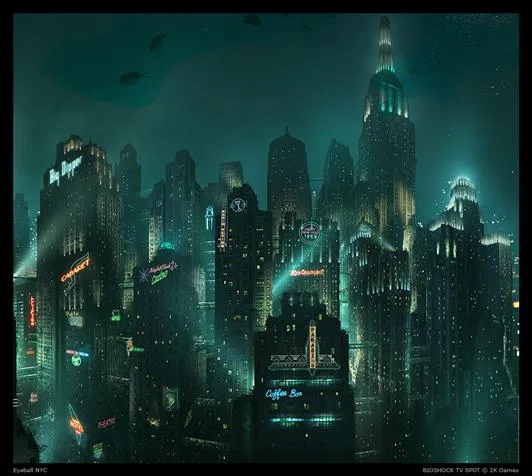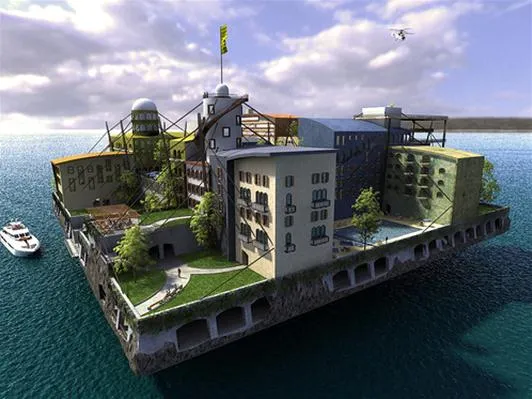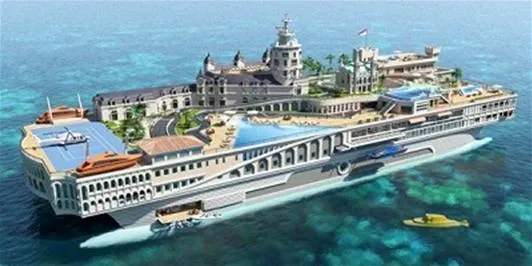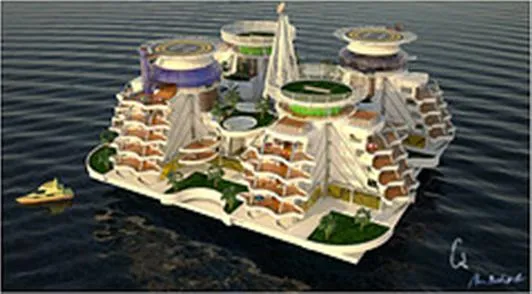BioShock is one of the best games of all time. It combines FPS gameplay with RPG storytelling and supports multiple systems better than any other game, that much is for sure. And the setting of its amazing story is a place called Rapture, a high-tech libertarian colony at the bottom of the Atlantic built by Andrew Ryan, a greying industrialist clearly inspired by John Galt and his creator Ayn Rand, the mother of Objectivism and modern American libertarianism in general. Ryan is a Soviet exile, just like Rand.

Ryan
Rapture was to be the first of a new type of city-state, a libertarian utopia free from the strictures of egalitarian socialism where each man is entitled to the sweat of his brow. But it does not work.

The Rapture skyline, when things were good.
Within just twelve measly years, Rapture has digressed into a beautiful nightmare of cannibalism and madness. This is when the game starts.

What Rapture became.
Real-life tech billionaire Peter Thiel bears some similarities to Rand, Ryan, and Galt. A consummate entrepreneur, he founded PayPal, gave Facebook its seed money, executive produced Thank You for Smoking, and has used two of his hedge funds to invest in a variety of space-age enterprises from private space travel to cheap gene sequencing. He is also a devoted libertarian, believing that social programs and enforced egalitarianism are the enemies of progress.

Thiel
Now, according to a long piece from this month's issue of Details, former Google engineer Patri Friedman (grandson of Milton) and his financial patron Thiel are proposing the construction of an unsettlingly similar project to Rapture. The Seasteading Institute plans to construct a series of modular, 12,000 ton, diesel-powered boats that could each hold 270 people.
These would be driven into international waters, away from the legal jurisdiction of any nation, and used to live out different visions of government seen as impossible to implement on the mainland. The only two described by Thiel or Friedman seem to be libertarian utopias (like Rapture) and corporate states straight out Snow Crash. No mention of a thought control utopia, a tribal communism, or any other radical state types that could use a test venue.

A particularly sunny vision of what a seastead could be. Watch for storms.

The Streets of Monaco, another ambitious proposed seastead or "flotel" as architect and Seasteading Institute stalwart Miguel Lamas calls it.

This one has more of a hotel/cruise ship feel, and looks a little lower to the surface than I would be comfortable with.

A particularly sunny vision of what a seastead could be. Watch for storms.

The Streets of Monaco, another ambitious proposed seastead or "flotel" as architect and Seasteading Institute stalwart Miguel Lamas calls it.

This one has more of a hotel/cruise ship feel, and looks a little lower to the surface than I would be comfortable with.
Thiel and his Founders Fund hedge fund (which also includes Sean Parker, late of Napster and Facebook) have only given $1.25 million to the project, hardly the lion's share of their operating budget. Perhaps they can see the obvious problems with this idea. How are these nation-states going to get food? It would be hard to grow on a boat, and it's difficult to see what they would produce in sufficient volume to trade with foreign nations for all that they could not make on their own. The engineering particulars of the project are sketchy as well: the studies available on the Seasteading Institute's website mostly concern the architectural side of the project rather than considering how these colonies will actually float comfortably and safely on deep seas.
To be clear, the Seasteading Institute is not trying to build these colonies itself. Its budget is described on their own websites as around $1,000,000. That's less than many people spend building big houses on land, let alone whole colonies on the ocean. Instead, their goal is to facilitate and encourage private development of seasteading projects by providing research and funding. They don't appear to have enough of either to make a difference yet. The institute is also offering The Poseidon Award to anyone who can set up a seastead meeting their criteria. No word on how much money the prize will entail, but the institute says it would like to start giving out the award in 2015.
It might be on the bottom of the sea rather than the top. Waterworld had floating colonies, too, and it was also not successful). But other than that, Rapture sounds a whole lot like what Thiel and Friedman are proposing. It didn't work out in the game, and the likelihood of it working long-term here is dubious even compared to the other failed libertarian utopias of the past, given the unique engineering problems inherent with living on the open water. The truth of people seems to be that government is inevitable when enough of us get together, as exhilarating as libertarian freedom sounds.
Are you really free if you have to spend most of your time fending off your gun-toting neighbors and trying to find a doctor that will accept physical goods in exchange for surgery?






Comments
Be the first, drop a comment!